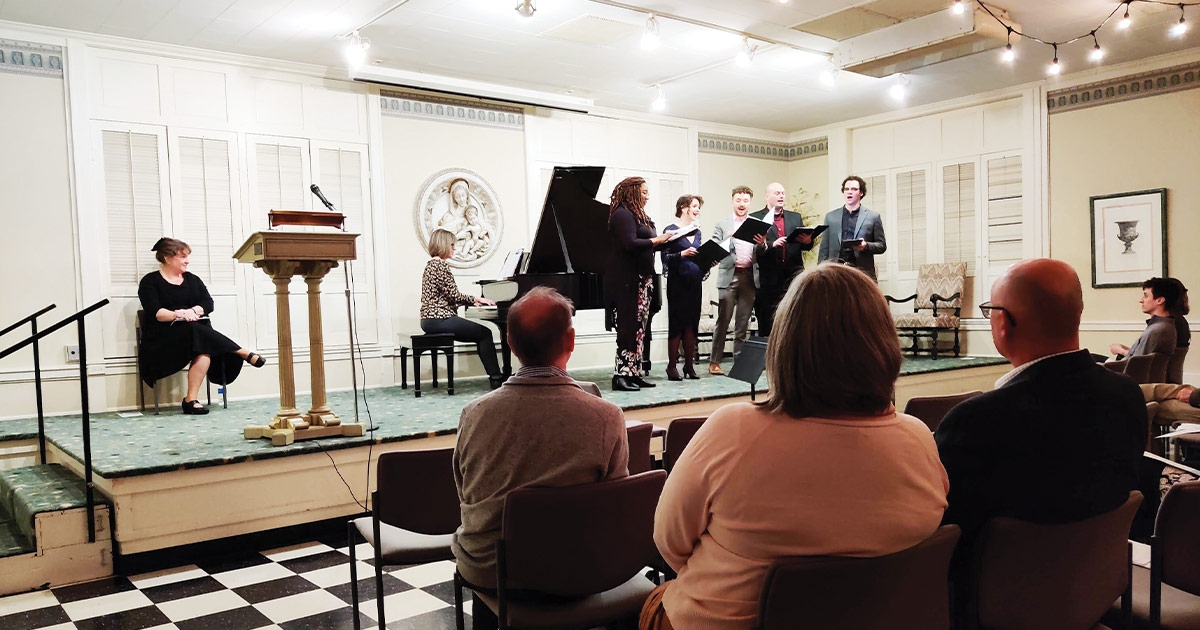Last words tend to go unrecorded and, in time, forgotten. Those that long outlive their speakers often surprise through their wit or profundity, and Opera Grand Rapids understands this.
For wit, we have what are said to have been Oscar Wilde’s last words (“Either that wallpaper goes, or I do”); for profundity, Emily Dickinson’s (“I must go in, the fog is rising”).
Whether they truly were those authors’ last words is in some sense immaterial; they capture something important about both: in Wilde’s case, an ironic frivolity in the face of what we think of as the mortally serious, and in Dickinson’s, an elliptical and visionary bravery.
Jane Austen, who died at 41 years old of what might have been Addison’s disease, is said to have responded, when asked what could be brought to her, “Nothing but death.” Punchy, confident, and memorable; that certainly sounds like her. More than 200 years later, her image remains remarkably sharp. Austen has inspired movies, TV shows, conferences, quilts, and—coming at last to the point—events, including Opera Grand Rapids’ second annual Opera Is Lit event, which takes place March 23.
Camellia Adams (Cammi when her feet are up), musicologist and member of the Grand Rapids Scottish Society, knew the power literature could have when set to music, having done programming for the society’s Robert Burns supper.
At a 2020 birthday celebration for Wolfgang Amadeus Mozart, who, being dead, couldn’t attend, Adams approached Opera Grand Rapids’ director Emilee Syrewicze. “Wouldn’t that make a fantastic program,” she asked, “an evening of work by English poets and composers set to music?” Syrewicze’s face lit up, and she asked Adams to e-mail her with her ideas.
The pandemic delayed the first event, which finally took place in the Sweet House, in March of 2022. Adams had researched five centuries, the 16th into the 21st. She emceed the event, providing details about the composers and poets, sprinkling history in between readings by local volunteers. The readers weren’t professionals; instead, they were the kind of people you know and love: middle school students, a retired social worker, professors, an insurance guy. The event was laidback, entertaining, engaging; in other words, deliberately unstuffy. “It was just delightful,” Adams said.
Jon Lovegrove, a tenor soloist who often performs with Opera Grand Rapids, echoes that characterization of the evening as laidback and approachable. Bariton Kohl Wesiman agreed, saying it was “so funny and full of personality.” Singer Avalon Cutts-Jones said that, for all that the music was wonderful, it served the authors; “the music was the star,” she wrote.
After the success of the first event, it became clear that Opera Is Lit should become a series. Rather than training its spotlight on several writers, this second event, which takes place March 23rd, will devote itself to one: Jane Austen.
Austen was born in 1775, a year not unfamiliar to history students; she died in 1817, nearly forty-five years before the Civil War would take place. Austen was English, of course, but would not have been unaware of the revolutions in America and France, and she lived contemporaneously to the less bloody musical revolutions of Mozart, Haydn, and Beethoven.
Austen loved music: folk music, parlor music, French composers like Ignaz Pleyel. Her family had eighteen volumes of sheet music. At the time, sheet music was very expensive; if you were lucky enough to have a piece, you’d share it with family and friends, who would copy it onto manuscript paper.
The Austen’s collection was divided into four categories: Scottish and Irish folk tunes; classical composers; arias; and piano music. Austen loved playing piano, creating a soundtrack for dances.
At the event, Adams will lead a program focusing on three areas: music from Austen’s personal portfolio, music from the Georgian and Regency areas, and music used in film and stage adaptations. She will narrate a story about Austen’s life, weaving in quotations from Austen’s novels and letters to her beloved sister Cassandra (these read by two local teenagers, one Adam’s daughter, a ninth grader).
Readings by teenagers? It’s appropriate; after all, Austen herself never got old. And her novels are largely populated by young people, people ranging in age from 13 to 22--people consumed by lust, romance, and betrayal, passions that for many are strongest then.
Asked why Austen continues to fascinate us, Adams points to her cleverness, her wit, and her ability to poke at society without becoming abrasive. Indeed, in life Austen was known as The Poker; she would sit by the fireside, where a poker would normally rest, and observe the people around her, until, finally comfortable, she’d get up and converse with them, lightly poking.
The truth is that Austen hasn’t said her last words yet; she’s still speaking. On March 23rd, attendees will have the opportunity to hear her do so, accompanied by fine music and unpretentious storytelling. Sounds like the hottest ticket in town.
Opera is Lit
City Flats Ballroom
83 Monroe Center St. NW, Grand Rapids
March 23, 7 p.m.
operagr.org





